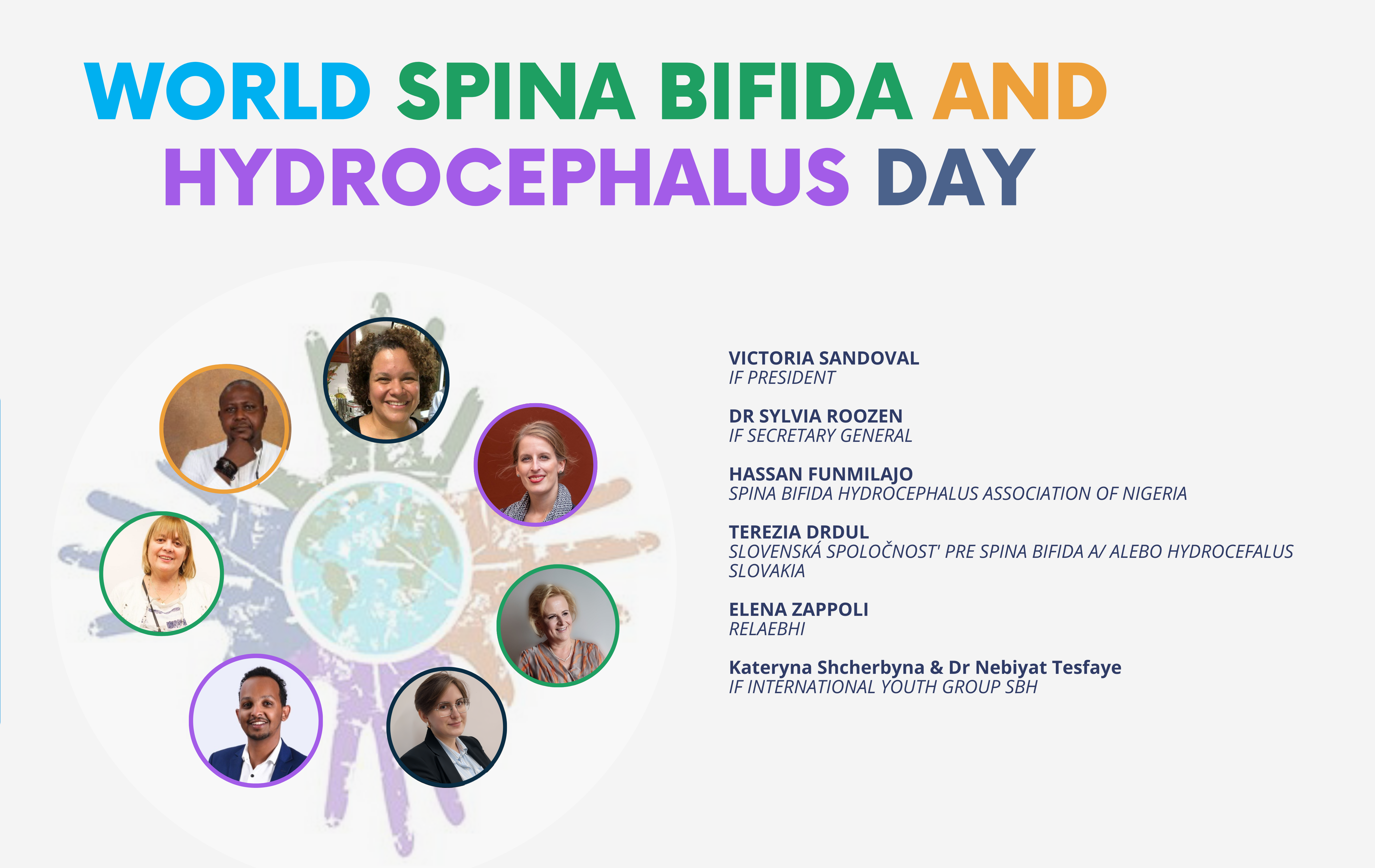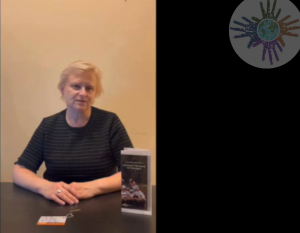Bridging Gaps Together on World Spina Bifida and Hydrocephalus Day

Highlights from our WSBHD conference webinar
During this year’s World Spina Bifida and Hydrocephalus Day (WSBHD) on 25 October, we brought further awareness as to how we can bridge the gaps for our global SBH community. This day was part of our 30th International Conference on Spina Bifida and Hydrocephalus: ‘Bridging the Healthcare and Prevention Gaps – A Multidisciplinary Team Approach With the Community at Heart’, organised on 24-26 October 2024 in Kuala Lumpur, Malaysia.
For the first time we were able to organise the meeting in a hybrid way with 350 participants from 30 countries attending our conference in Malaysia in person, and 32 joining our conference webinar online. The webinar was also streamed on Youtube where it has 112 views.
This year’s theme ‘Bridging Gaps Together’ was chosen by IF members as a topic of paramount importance for the Spina Bifida and Hydrocephalus (SBH) community. To the present, there are many barriers which individuals with SBH face. With stigma, discrimination, and a lack of awareness creating additional barriers to the full participation in life’s opportunities.
During the conference webinar, nine speakers from the African, Latin American, Asia-Pacific, and European regions were invited to share with us how their associations work to bridge gaps together to advance the rights of persons with SBH.
The opening words were given by IF President, Victoria Sandoval, and IF Secretary General, Dr Sylvia Roozen who expressed the importance of bringing the community together to further accelerate the awareness and advocacy efforts to topics relevant to the SBH community as part of the WSBHD. As IF President, Victoria Sandoval, emphasised: “Advancing disability inclusion is fundamental to leave no one behind”.


The next panel of speakers covered different ways on how to bring the community together during the WSBHD, such as:
- A walk the talk to emphasise on accessibility for all;
- Awareness raising activities focusing on ability and not on disability;
- The importance of national and regional support networks in times of crisis;
- Awareness of the opportunities and challenges of global ageing;
- Youth active participation and capacity building around the topic of mental health;
- The 30th International Conference on SBH facilitating dialogues among a wide range of participants.
A walk the talk to emphasis on accessibility for all
For WSBHD, Spina Bifida Hydrocephalus Association of Nigeria (SBHAN) planned an awareness raising advocacy walk starting from an accessible park in Lagos. Hassan Funmilajo from SBHAN highlighted that the aim of this walk is to break the myths of our society about SBH and show that people with SBH also have a right to live and be part of the community.
Hassan also discussed the challenges people with SBH in Nigeria face due to a lack of inclusion and accessibility and the efforts SBH organisations make to enhance the quality of life of people with SBH. “Most times our kids are kept at home and they cannot go out due to inaccessible roads and accessibility issues. They do have inclusion in terms of being able to interact with society”, said Hassan.
Hassan also explained how the SBH community in Nigeria is joining forces to create opportunities for children with SBH to socialise and show their abilities, for example through sports and recreational activities.


Awareness raising activities focused on ability and not on disability
 Next, the President of the Slovak Association of Spina Bifida and Hydrocephalus, Terezia Drdul, shared the announcement of an impactful documentary they created this year to mark their 20th anniversary as the representative SBH association in Slovakia. Terezia expressed that they have different activities in place to bring further awareness on the focus of ability instead of disability this year.
Next, the President of the Slovak Association of Spina Bifida and Hydrocephalus, Terezia Drdul, shared the announcement of an impactful documentary they created this year to mark their 20th anniversary as the representative SBH association in Slovakia. Terezia expressed that they have different activities in place to bring further awareness on the focus of ability instead of disability this year.
A particular highlight of this year’s WSBHD was their premiere of the documentary ‘Seeking the Edge of Possible’ under the auspices of the Slovak paralympic champion in shooting, Veronika Vadovičová, who is living with Spina Bifida. The documentary is available in Slovak and also with English subtitles. During the premiere, Veronika Vadovičová described the documentary as another milestone not only for people with Spina Bifida, but for people with disabilities in general.

Terezia shared that the association is very fortunate to have Veronika as a real role model promoting the work by the association. This has generated a lot of media attention, also for other awareness raising activities as part of the WSBHD throughout the month of October.
The importance of national and regional support networks in times of crisis
Elena Zappoli, Chair of the Latin American Network for Spina Bifida and Hydrocephalus (RELAEBHI), and former President of the Argentinian Association for Spina Bifida, addressed how recent economic and environmental changes in Argentina have impacted the work by her and her association on a national level. Elena emphasised that there is a continuous need to advocate for primary prevention since national policies have taken a turn on mandatory flour fortification as a helpful tool for the prevention of Neural Tube Defects (NTDs). When changes like this occur, Elena expressed the determination of the Argentinian Association for Spina Bifida to continue their strong efforts for the advocacy on primary prevention, as well as multidisciplinary care for the SBH community.

Furthermore, Elena explained that now more than ever there is a need to strengthen support networks in Argentina and the Latin American region. As a next step she shared the wish for a next regional meeting to allow for networking and strengthening activities together with people with SBH and their families, as well as doctors, industry partners and academic institutes.
Providing awareness of the opportunities and challenges of global ageing
On behalf of IF’s Working Group on Ageing, there were two speakers who expressed the need of improving our understanding of the lived experiences of older persons with SBH.

As a former Chair of this Working Group, Dr Kevin O’Donnell from Spina Bifida Hydrocephalus Scotland, emphasised that for the first time in human history, there is a large and growing group of people with Spina Bifida in their sixties. Due to improved treatment and care, many people with SBH are now reaching their senior years. At the same time, we know very little about ageing with SBH and its impact on physiology, mental abilities and independence. This underscores the need for the IF Working Group on Ageing with SBH.
 Another long time member of the Working Group, Gerry Maguire from Spina Bifida and Hydrocephalus Ireland, spoke about the importance of mental health. Gerry inspired the topic by sharing his ‘mantra’ that dealing with a physical disability is as much in the mind as it is in the body – both are equally important. He closed by saying that we need to attend to the psychological demands placed upon our bodies as well as the physical demands.
Another long time member of the Working Group, Gerry Maguire from Spina Bifida and Hydrocephalus Ireland, spoke about the importance of mental health. Gerry inspired the topic by sharing his ‘mantra’ that dealing with a physical disability is as much in the mind as it is in the body – both are equally important. He closed by saying that we need to attend to the psychological demands placed upon our bodies as well as the physical demands.
If you are interested, you can find out more about the work of the Working Group on Ageing on IF website. You can also share your nomination by contacting [email protected].
Youth active participation and capacity building around the topic of mental health
The 30th International Conference programme gave IF Youth Group good visibility and opportunities for networking. IF Youth Group representatives, Kateryna Shcherbyna (Chair) and Dr Nebiyat Tesfaye shared the experience of presenting at an international stage, meeting young persons from around the globe, engaging with health care professionals, industry partners and policy makers, and gathering inspiration for their next activities. In particular, they emphasised on the important topic of mental health for which they shared different activities from this year’s work. For instance, on the International Youth Day, IF’s Youth Group organised a webinar to exchange insights on how to improve disability acceptance.


As for the Youth Group’s future plans, several activities will take place such as youth meetings and webinars, awareness raising campaigns, and training for youth advocates.
If you are interested, you can find out more about the Youth Group’s work on IF website. You can also share your nomination to join the Youth Group at [email protected].
Experiences from the 30th International Conference on Spina Bifida and Hydrocephalus in Malaysia
While words cannot explain all the activities taking place during the 30th International Conference on SBH in Malaysia, there was a special moment arranged to emphasise on awareness raising activities as part of the WSBHD which you can review in this video:
For each annual WSBHD we focus on a different theme that is chosen by the SBH community. For this year it was a great opportunity to link the ‘Bridging Gaps Together’ theme with the 30th International Conference in Malaysia. As it was visible through this conference webinar, the theme allowed for different advocacy priorities, as well as a wide range of activities taking place around the world in our joint celebration of the WSBHD.
We are grateful to all the wonderful panellists who enriched this WSBHD webinar by sharing their advocacy work. The WSBHD was undoubtedly a great opportunity to share our experiences and achievements, learn from each other, get inspired and join forces to bridge gaps all together!
From all the contributions which we received by pictures, videos and texts, we really commemorated the awareness day and month in a colourful way together!
In conclusion, we look back at a very successful first hybrid format of the WSBHD 2024. There is a need to continue facilitating these dialogues and interactions together with our members and partners around the globe.
Stay tuned for the upcoming opportunities and we welcome your suggestions for next year’s theme for the WSBHD 2025!
More information

